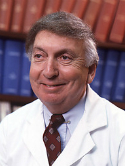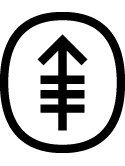Colon carcinoma cells switch their response to transforming growth factor β(1) with tumor progression Journal Article
| Authors: | Hsu, S.; Huang, F.; Hafez, M.; Winawer, S.; Friedman, E. |
| Article Title: | Colon carcinoma cells switch their response to transforming growth factor β(1) with tumor progression |
| Abstract: | Transforming growth factor β1 (TGF-β1) switches from an inhibitor of tumor cell growth to a stimulator of growth and invasion during human colon carcinoma progression. We originally observed that metastatic colon carcinoma cells in primary culture responded to TGF-β1 by proliferation, whereas moderate to well-differentiated primary site colon carcinomas were growth inhibited by TGF-β1 (P. Schroy et al., Cancer Res., 50: 261-265, 1990). We then cloned several colon carcinoma cell lines which modeled these responses to TGF-β1 and expressed TGF-β1 (M. M. Hafez et al., Cell Growth and Differ., 1: 617-626, 1990; 3: 753-762, 1992). Two of these colon carcinoma cell lines, U9 and HD3, which activate approximately equal amounts of TGF- β1 and express equal amounts of TGF-β receptors, are now used to compare the effects of TGF-β1 in modulating invasive behavior. The U9 cell line exhibits autocrine-positive growth regulation in vitro by TGF-β1, whereas the HD3 cell line shows the opposite response, autocrine-negative regulation. Blocking endogenous TGF-β1 with isotype-specific antibody inhibited U9 cell growth because autocrine TGF-β1 acts as a mitogen for U9 cells. In contrast, antibody to TGF-β1 stimulated HD3 cell proliferation because autocrine TGF-β1 inhibits growth of these cells. U9 cells were 13-fold more invasive in vitro through a collagen I layer than HD3 cells. In vitro invasion by U9 cells but not by HD3 cells was stimulated 2-fold by TGF-β1, and U9 invasion was inhibited by antibody to TGF-β1. When injected into athymic mice, U9 cells induced tumors 6-fold the size of those induced by HD3 cells. Tumors induced by each cell line retained expression of TGF-β1 in vivo, as shown by immunohistochemistry using isotype-specific antibody. Antibody to TGF-β1 inhibited the growth of U9 cells in athymic mice 4-fold compared to control antibody, demonstrating that autocrine TGF-β1 stimulated U9 cell growth in vivo. Thus, the U9 cells with autocrine-positive growth regulation by TGF-β1 were more tumorigenic in vivo and more invasive in vitro than HD3 cells with autocrine-negative regulation by TGF-β1. Differences in the induction of three immediate early genes were observed between TGF-β1 growth-stimulated U9 cells and TGF-β1 growth-inhibited HD3 cells. Thirty min of TGF-β1 treatment stimulated expression of c-fos approximately 50-fold in TGF-β1 growth-inhibited HD3 cells, whereas only a 2-fold induction was observed in U9 cells. A small increase (50%) in expression of c-jun was seen with TGF-β1 treatment in HD3 cells, whereas expression of c-jun was inhibited in U9. In contrast, c-myc was inhibited 3- 5-fold by exogenous TGF-β1 in both HD3 and U9 cells, suggesting a common role for c-myc in both responses to TGF-β1. |
| Keywords: | human cell; nonhuman; mouse; animal; mice; cell division; transforming growth factor beta; colonic neoplasms; cancer cell culture; tumor cells, cultured; cancer invasion; cancer inhibition; mice, nude; collagen; transforming growth factor beta1; neoplasm invasiveness; tumor promotion; tumor growth; colon carcinoma; growth factor receptor; proto-oncogene proteins c-fos; human; male; priority journal; article; support, non-u.s. gov't; support, u.s. gov't, p.h.s. |
| Journal Title: | Cell Growth & Differentiation |
| Volume: | 5 |
| Issue: | 3 |
| ISSN: | 1044-9523 |
| Publisher: | American Association for Cancer Research |
| Date Published: | 1994-03-01 |
| Start Page: | 267 |
| End Page: | 275 |
| Language: | English |
| PROVIDER: | scopus |
| PUBMED: | 8018559 |
| DOI/URL: | |
| Notes: | Export Date: 14 January 2019 -- Article -- Source: Scopus |
Citation Impact
Related MSK Work




